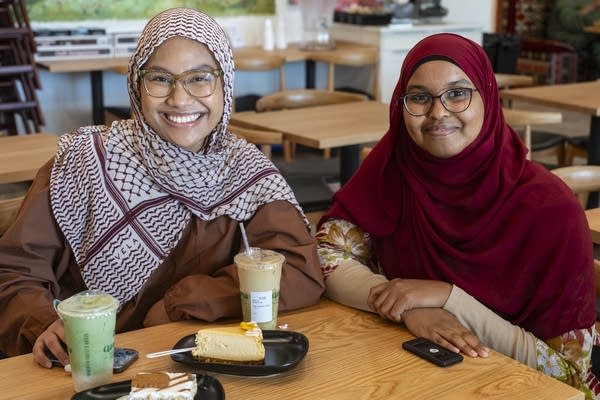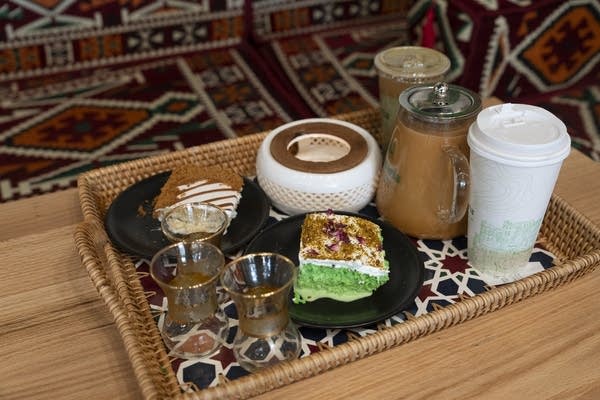
Environmental groups say state agencies too lax with polluters
June 11, 2024
Robots with hoes show farmers possible future of weed control
June 13, 2024Listen to the interview with Sahan Journal reporter Hibah Ansari on Minnesota Now, hosted by Cathy Wurzer and produced by CJ Younger.
This story comes to you from Sahan Journal through a partnership with MPR News.
Growing up in an immigrant Somali and Yemeni household in California, Mohamed Hagi had a deep connection to the hospitality and coffee culture of that part of the world.
But it was a visit to a Yemeni coffee shop in New York that inspired him to bring that culture to Minnesota.
Hagi, who seeks out coffee shops wherever he travels, said he found a feeling of welcome during his fall 2021 visit, despite being surrounded by locals and other tourists. As he drank tea and ate a honeycomb pastry looking out into the city, he knew he wanted to recreate the same ambiance in his new home.
Two years later, Hagi, 29, opened the Twin Cities’ first Yemeni coffee shop in Little Canada, in May. Thanks to early publicity by social media influencers, Qamaria Yemeni Coffee Co. is already attracting lines out the door, Hagi said.
Qamaria is one of two Yemeni coffee shops that will open in the Twin Cities this year: Qahwah House, another national chain, plans to open in northeast Minneapolis this fall.
The sudden boom in Yemeni coffee shops in the U.S. is due to two factors: Yemen’s storied coffee culture, and the need for public spaces for young Muslims, who often have difficulty finding places to socialize in the evening that don’t serve alcohol.
“We always wanted to incorporate a space here where it was an untapped market,” Hagi said. “Where not only the larger African or Arab community, but the Muslim community as a whole can congregate, study, hang out.”
He also wanted to create a space where people of all backgrounds could discover Yemeni coffee.
First in Minnesota
Hagi’s Little Canada coffee shop is the first Minnesota site for Qamaria. While the Qamaria roastery is based in Michigan, it has franchise locations in Illinois, Texas, California, Wisconsin, and now Minnesota. Hagi connected with the owners of the franchise through a family friend.
The Little Canada location had its soft opening on May 4. The coffee shop will have its official opening on June 21. Qamaria is currently open from 9 a.m. to 10 p.m. After the official opening, Hagi said he hopes to extend its hours to 11 p.m. on the weekdays and midnight on weekends. He said he also plans to expand the pastry selection to include savory items.
Prior to opening, Hagi said he worked closely with the city of Little Canada and also checked with Ramsey County to make sure the business was allowed to stay open late.
Several local Muslim cafe owners have pushed to add late-night hours recently, including the Nomadic Cafe in Bloomington, and The Golden Nuts, a dessert-and-nut shop in Columbia Heights. At least one has experienced pushback: Mrs. Dessert & Kumpir, a Turkish cafe in northeast Minneapolis, struggled to get a temporary license from the city to extend its hours during Ramadan.
A rich, coffee-brewing culture
Coffee-growing has a centuries-deep history in Yemen and in neighboring Ethiopia. So do the social “third spaces” — outside of the home and the mosque — that sprang up in coffee- and tea-drinking cultures.
“There’s kind of a mixture of opinion in terms of where coffee originated. Some people say Yemen, and some people say Ethiopia. It’s somewhere in that region,” Hagi said. “But the coffee bean is something that’s really rich in that area.”
Growing up in San Diego, Hagi said he would often drink tea or coffee sitting on the floor while visiting people. Hosts would also offer visitors sweet treats.
Hagi’s parents were both refugees. His father is from Somalia and his mother is from Yemen.
“It wasn’t like we had a lot of opportunities in terms of financial freedom. I wanted us to reach that American Dream,” Hagi said. “Growing up low-income, those small memories of sharing food with your family or tea and coffee, that’s something that’s really rich and memorable.”
Hagi previously worked in IT but had been thinking about ways to break out of the corporate sector and start his own business.
Hagi said many East Africans have brought that culture to their new home. Somali coffee shops are common in some Twin Cities neighborhoods, and it’s not uncommon to see elderly people spending hours in a large-chain coffee shop amongst the rush of commuters ordering to go. He hopes that Qamaria can be a place where customers young and old feel at home.
Hagi said the busiest times of the day at Qamaria are often during the morning work commute, as well as the evening hours for people who want to dine in.
Since opening, Hagi said the coffee shop has expanded beyond the Muslim communities of the Twin Cities and to draw coffee connoisseurs from a variety of backgrounds.
“It’s more so an experience,” Hagi said. “And the richness of the coffee bean is something that, for real coffee lovers, they can really appreciate.”
Hagi’s favorite drink on the menu is the Adeni chai, a black tea brewed with evaporated milk, cardamom and other spices.
“It really reminds me of home,” he said. “When I was younger, I’d always have a cup of tea in the morning.”
Other popular items include the pistachio latte, and the Qamaria latte, which features cardamom and cinnamon. The chain is also known for its desserts, including a bright-green pistachio milk cake and the honeycomb, a sweet bread filled with cheese with honey drizzled on top.
On a recent Wednesday evening at the coffee shop, a group of friends, Fatuma Mohamed, Ihsan Ibrahim and Siham Sharif, all 22, sat at a booth drinking iced lattes and sharing a slice of pistachio milk cake. Most of them had come for the first time, except Siham. The first time she came, she waited in line for two hours.

“But the servers were really nice and apologized,” Siham said. Her friends agreed that the customer service was great.
Weeks after opening, the shop was still busy with dozens of customers.
Ihsan had heard from people that the coffee was just OK. “I’m not going to lie,” she said. “When I tasted it, I was like ‘What are they talking about? This is good!’”
Fatuma thought the location was a bit far from her home in St. Paul. But when asked about the hype surrounding Qamaria, she wasn’t surprised about the long lines.
“I think it’s valid,” she said. “Minneapolis doesn’t have a lot of places for Muslims to hang out. We’ve just been waiting. So when news broke that Qamaria opened up, of course we’re going to run to it.”
When choosing a location, Hagi said he wanted to secure a space that was big enough to accommodate large groups, with plenty of parking, and easy access to freeways. While searching for a space in Roseville near the shopping center, he came across the current space in Little Canada.
“What we had seen initially had a lot of work but we really had seen the vision,” Hagi said.
The space is decorated with art painted on the walls, such as a mural of Qamaria’s iconic Yemeni woman adorned in a scarf and head jewelry. The space also has traditional couch seating, and lots of wicker decor. There’s also an enclosed conference room for people who want a quieter place to work.
Hagi said he welcomes the competition from Qahwah House, and the sudden growth of Yemeni coffee chains. He’s already looking for opportunities to open new Qamaria locations in the south metro.
“Whenever something large hits the community, there’s always going to be competition,” he said. “There’s a need in the community so diverseness is always welcome. But for us, we’re not really worried about others, we’re worried about how we continuously can grow.”





